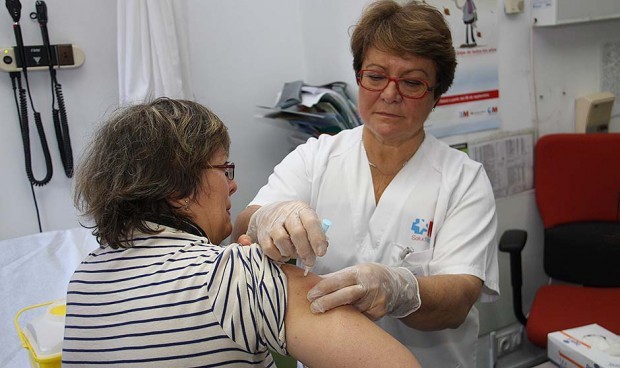he Interregional Committee on National Health Systems Approved Influenza and Covid-19 Vaccination Recommendations for the 2023-2024 Season.The novelties in this document focus on Modification of two influenza vaccine componentsin addition to collecting the following groups, which have also changed relative to previous vaccination campaigns “Target population” They should prioritize these vaccines along with the Covid-19 vaccine, emphasizing people over the age of 60, people with “at-risk conditions” or people who are pregnant, etc.
Compared to the previous season, there are the following: Changes in vaccine composition for the 2023-2024 season: “The A(H1N1) component, formerly the similar strain A/Victoria/2570/2019 (H1N1)pdm09, has been replaced by Strains similar to A/Victoria/4897/2022 (H1N1)pdm09 in vaccines produced from embryonated eggs and live attenuated vaccines,” they noted.
The second change is in the A(H1N1) component, where the previous A/Wisconsin/588/2019-like strain (H1N1)pdm09 has been replaced by Mock strain A/Wisconsin/67/2022 (H1N1)pdm09 In vaccines produced from cell cultures.
Flu and Covid-19 vaccination campaign to start in October. Vaccinations for persons with disabilities and people aged 80 and over in nursing homes and other care centers may be prioritized, and due to the “strategic importance” played by health and social health staff, their vaccinations may also be prioritized. “Vaccination will continue until the end of the seasonal season. Vaccines against Covid-19 may be administered outside of vaccination campaigns to persons who request them following an individualized assessment. In these cases, the time interval from previous vaccination or infection (for at least 5 months)”, they concluded.
A monovalent vaccine for the next COVID-19 campaign
related Monovalent Covid-19 VaccineOn May 18, 2023, the World Health Organization issued a statement on these ingredients.in which he recommended Administration of omicron XBB.1 variant monovalent vaccine And/or other preparations that achieve an immune response against the subvariant.
June 6, 2023 European Medicines Agency (EMA) The European Center for Disease Prevention and Control (ECDC) and the European Center for Disease Prevention and Control (ECDC) have published a joint statement on updates to the composition of the Covid-19 vaccine against new variants of the SARS-CoV-2 virus.In it they recommend vaccination for the next season in 2023-2024 “XBB subvariants against omicron strains are monovalent”preferably XBB.1.5, which ensures protection against infection by circulating strains of SARS-CoV-2.
“These vaccines can as a booster dose or as the primary vaccine. To date, no vaccines meeting these requirements have been licensed, but are expected to be licensed before the start of the 2023-2024 season. In Spain, as of the date of this document, The following vaccines are available: Original Comirnaty/omicron BA.4-5; Original Spikevax/omicron BA.1; Original Spikevax/omicron BA.4-5, VidPrevtyn and Bimervax. Newly adapted vaccines are expected to be available before the start of the season,” the document states.
“Target population” in the fight against COVID-19 and influenza in 2023/2024
for him Increased risk of complications or serious illness If you have the flu or a Covid-19 infection, they first recommend Vaccinations for People 60 and Over and from Internship in a nursing home for 5 years or more and centers for the disabled, as well as other long-term housing and residents of closed institutions.
For persons under the age of 60 with at-risk conditions, the Department of Public Health has approved the following:”diabetes and Cushing’s syndrome, Morbidly obesechronic cardiovascular, neurological or respiratory diseases, including bronchopulmonary dysplasia, cystic fibrosis and asthma, chronic kidney disease and nephrotic syndrome, hemoglobinopathies and anemia or hemophilia, other coagulation disorders and chronic bleeding disorders, and recipients of blood products and multiple transfusions, asplenia or severe splenic dysfunction, chronic liver diseaseincluding chronic alcoholism and severe neuromuscular disease,” the document lists.
Also includes Immunosuppression, Cancer, and Hematologic Malignancies, cerebrospinal fluid fistula and cochlear implant or waiting, celiac disease, chronic inflammation, and diseases involving cognitive impairment.end of this list Vaccination is also recommended for pregnant women “Women in any trimester of pregnancy and the puerperium (women who were not vaccinated within 6 months after giving birth and during pregnancy) and People who live with someone who is highly immunosuppressed.
|
Interterritorial committee also recommends flu and Covid-19 vaccinations for health personnel and national security forces
|
Advice for critical and essential services
The Interterritorial Council stated that in order to Reduce impact and maintenance of critical services Crucially for the community, the flu vaccine and the Covid-19 vaccine are recommended for both groups.On the one hand, for Staff in public and private health and social health centers “Whether it’s hygienic or not, except for students who are advised to only get the flu shot.”
On the other hand, those engaged in “basic public service” work, with special emphasis on national security forces and agencieswith country, region or local dependence, Firemen and service civil protection.
Additionally, the document states The ‘Extra’ Part of Your Flu Vaccinationrecommended for children 6 to 59 months of age and persons 5 to 59 years of age who are at higher risk of derivative complications, such as smokers and persons 5 to 18 years of age who receive long-term acetylsalicylic acid therapy , because of the possibility of Reye’s syndrome following influenza.
“Also for Intern at the Center for Health and Social Health and people who Direct occupational contact with animals or their secretions on farms o Poultry, pig or mink farms or wildlife groups (birds, wild boar or mustelids) such as farmers, veterinarians, farm workers, hunters, ornithologists, conservationists, zoo workers, etc.The purpose is Reduce the chance of co-infection with human and poultry or swine virusesreducing the possibility of recombination or gene exchange between the two viruses,” they noted.
Although Redacción Médica may contain statements, data or notes from health authorities or professionals, the information contained in Redacción Médica was compiled and prepared by journalists. We recommend that readers consult a health professional with any health-related questions.

